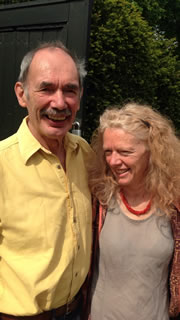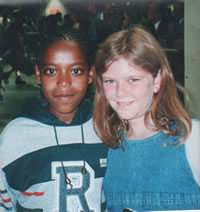Couple Changes Lives Of Forty Children World Wide
With local charity Bridge Of Hope which send children and young adults to school
Over the past 20 years,
Michael Davenport and his wife Katie Campbell have welcomed 40 seriously ill children from all around the world into their home so that British surgeons could save their lives.
As if that wasn’t enough, they have also paid for six other youngsters in the developing world to go to school, and they have now launched an appeal to help still more. Michael, a leading development economist, said:
“When we were first asked if we’d be able to give room in our home to a child who was flying to Britain for life-saving surgery we didn’t hesitate to say ‘yes’. It was a small act; we are lucky enough to have a spare bedroom and we wanted to help. We didn’t know at the time, but over the next 20 years, we were to become hosts to a further 39 children , some of whom we continue to help by funding their education."
 Today the couple, (pictured left) who live in Putney, are paying to educate two children in Tibet, one from Kenya and two from Ethiopia through Chelsea-based charity Bridge Of Hope which gives grants to fund the education of underprivileged children.
Today the couple, (pictured left) who live in Putney, are paying to educate two children in Tibet, one from Kenya and two from Ethiopia through Chelsea-based charity Bridge Of Hope which gives grants to fund the education of underprivileged children.
Michael says:
"As an economist, I know that education is one small but vital part of the jigsaw of improving countries from the grass roots upwards - that's why the work of the charity is so important .”
The family's journey began 20 years ago when Katie and Michael - who during an illustrious career worked for the Treasury, World Bank, and European Commission- agreed to become a host family for London-based charity Chain Of Hope.
The organisation, founded by world-renowned surgeon Professor Sir Magdi Yacoub, has saved the lives of thousands of desperately sick children from 30 countrieApril 23, 2015 surgery.The first child who came to stay was a nine-year-old Ethiopian girl called Almaz who had a heart condition
that could kill her at any time.
Author and academic Katie says:
“Initially, I wasn’t motivated by any particular altruism; I felt my daughter Jess, who was seven at the time, had a very privileged life and I wanted her to understand that wasn’t the way most people in the world lived. For us the only commitment was our time and the use of our spare bedroom.“I made just one stipulation. I said I wanted to host a girl as I felt that in Africa, girls were less likely to get preferential treatment.“
 "Almaz, pictured left with Jess, arrived alone and she was so tiny and frail with such dignity and courage – she was absolutely exquisite. Even though she was nine-years-old she was tinier than Jess. She was so trusting, even though we were total strangers, Because she’d been sick all her life, she was used to being with strangers given all the doctors and nurses she’d seen through the years.
"Almaz, pictured left with Jess, arrived alone and she was so tiny and frail with such dignity and courage – she was absolutely exquisite. Even though she was nine-years-old she was tinier than Jess. She was so trusting, even though we were total strangers, Because she’d been sick all her life, she was used to being with strangers given all the doctors and nurses she’d seen through the years.
“Knowing that without treatment she’d stand no chance was very sobering – but we also knew as soon as she was well she’d be leaving us and returning to her family. We were so sad to see her go as she became very much a part of our family. But what was absolutely incredible was seeing how a group of expert surgeons could give a child their life back, and that’s what made us agree to become hosts again... and again.
“In some ways these were chance encounters with people who shared your home and you glimpsed into some of the most difficult times of their lives. Of course, at times it was sad, but mostly it was just extraordinarily inspiring
- the bravery and nobility of these people, often coming from remote villages, having to adjust to strange food and completely unfamiliar customs.
“That first encounter, with Almaz had such an impact on Jess that it was she who encouraged us to continue to take in other sick children, sometimes for weeks, other times for months at a time. Some of them you forget pretty quickly, and others we'll remember forever. One such memorable guest was a mother called Grace who arrived with her daughter Gracia, pictured below, from Kenya for life-saving heart surgery.
 Katie said: “Gracia was extremely sick and she very nearly died so they lived with us for three months while the surgeons worked to repair her heart. Once in a casual conversation with Grace it became clear that she was being beaten by her husband back at home.I said: “That is not acceptable, why don’t you leave him?”“She said: “What would I do if I left?” and I said; “Well, what do you want to do?” .“She confessed that she'd always dreamed of having a sewing business.'
Katie said: “Gracia was extremely sick and she very nearly died so they lived with us for three months while the surgeons worked to repair her heart. Once in a casual conversation with Grace it became clear that she was being beaten by her husband back at home.I said: “That is not acceptable, why don’t you leave him?”“She said: “What would I do if I left?” and I said; “Well, what do you want to do?” .“She confessed that she'd always dreamed of having a sewing business.'
Through Bridge Of Hope, founded by Sir Magdi's daughter Lisa Yacoub, two hand sewing machines were sent to Kenya to enable her to start her business.“Giving her financial independence allowed her to leave her abusive relationship and she now is able to care for her children without fear of violence,” Katie said.Katie then decided, through the Bridge Of Hope, that she would donate the funds to educate two of Gracia’s children Sharon and Rachel; Sharon is now a nurse, and Rachel is an accountant.
“I’d never give money direct, as I want to be sure it is going solely for their education – Bridge of Hope is good because it sends the funds directly to the schools,” she said.When Michael was diagnosed with Motor Neurone Disease three years ago the couple continued to help families in need.“I didn’t see why my condition should stop us doing this,” he said.
Two years ago Michael became a Trustee for Bridge Of Hope, inspired by the charity's success at sending children and young adults to school.
“As an economist working on developmental issues it was natural to
wonder: ‘what happens next when these children are well, and how can we help communities to help themselves?, Michael explains.
“Improved education in poorer nations is critical for future development, particularly in parts of Africa where non attendance at school is common leading to high levels of illiteracy.“I wanted to do something to help youngsters to escape from the cycle of poverty – and in doing so to contribute to economic development in their communities and countries. Donating is an easy enough thing to do, but if everyone gave just a small amount of money it’s incalculable just what a difference that could make to so many lives.
“Personally, it’s enough to know that my donation is going to educate these children and I’m happy that that is the extent of my commitment, in contrast to Katie’s more personal involvement. Nonetheless I do follow the children who receive our grants. But our donations are just the tip of the iceberg – there are so many children who need help to enable them to change not only their circumstances, but potentially the world around them through education.”
Bridge Of Hope founder Lisa Yacoub said: "The generosity of people like Michael and Katie has changed the lives of children - but there are many more who don't get the chance to fulfil their potential. Through education, entire communities can benefit and our appeal can make a real difference to lives."
To donate to the Bridge Of Hope's education appeal see: www.bridge-hope.org
April 21, 2015